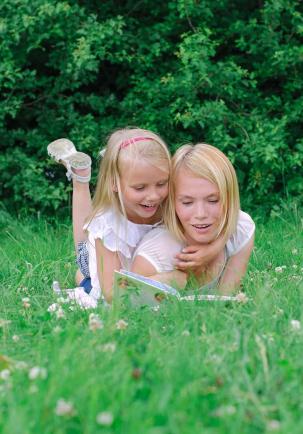
Reading to your children is a wonderful way to facilitate extra talking to children, especially if the words in the book become the jumping off point for more conversation.
Books open up a new window to peek at other people and places. An author may have a new voice that can share ideas mom or dad may not have thought about. Some combinations of words are just fun to say and hear. Good illustrations or photographs can zero in on a concept and facilitate understanding.
A good story should entertain both child and parent, and be a happy shared experience. As a preschool teacher of many years, and grandmother to 16 children, I've read a lot of books to children, and I have a few suggestions.
-
Start when they are very little. Even infants enjoy looking at picture books, and it gives mom and dad fun things to point to and talk about. Books soon become associated with warm and happy lap time.
-
Read a variety of books. Your child might always love a book about trucks or dearly want that tattered Tinkerbell story, but variety is at the heart of learning. Don't skip factual books with good illustrations and photos that give you more to look at and talk about.
-
Go ahead and read over and over that one special favorite book. When the story is familiar, it gives you room to pause and speculate about the characters and what they are thinking or why the illustrations show what they show. One year my preschool class requested over and over the book and the more we read it, the funnier it became to the children. Favorite stories can take on a life of their own.
-
Respond to what you are reading. I like to pause sometimes and say, "Oh my goodness! I wonder what will happen next."� Invite the child to wonder and speculate with you, but don't go on too long and let the story get lost.
-
Talk about what you've read. In the story, a little girl has trouble with a mean friend. It's a natural lead in for talking about friends, how we play, and if they have had experiences like that. Talk about stories you've read in the past when new experiences come up. "Look, it's a fire truck just like the one in the story! Only this one is yellow. Why do you think it's yellow, not red?"�
-
Make the story your own. Not every author is great, and he or she will never know if you do some free form adapting as you read. Go ahead and ramp up the drama or the silliness or change the names to match your children. Don't skip over the hard words. But go back and tell what the word means when the story is done, or say the word and then tell what it means in a couple of words as you read. Hearing new words is how young vocabularies grow.

